
Celebrating Women in Science
As part of a push to promote equal access to science for women and girls, the United Nations has named the 11th of February the International Day of Women and Girls in Science. In 2024, this is the ninth year running. STEM fields – science, technology, engineering and mathematics – are historically male dominated.
Data from the Australian Department of Industry shows that in 2023, only 37 percent of enrolments in university STEM courses were women, and just 15 percent of STEM qualified jobs were held by women.
To celebrate the contributions of women in STEM, we spoke to nine women scientists at UNE to hear about their love of science, and their advice for young women and girls looking to study or work in STEM fields.
Professor Sue Wilson – School of Environmental and Rural Science, UNE.
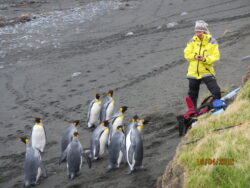 Always go with what you enjoy. You’ll always excel and feel good about things when you’re enjoying what you do. Work with people you enjoy working with and ask. Ask questions and take up challenges that are given to you, and if you feel that you get a bit sunk with the challenge, just ask, ask people around you. There’s lots of people around you that can support in your discipline, but my main piece of advice is always do what you enjoy, and if you’re not enjoying something at that stage, have a look at other options, talk, ask, ask the questions, and then have a go at something different within that science discipline.
Always go with what you enjoy. You’ll always excel and feel good about things when you’re enjoying what you do. Work with people you enjoy working with and ask. Ask questions and take up challenges that are given to you, and if you feel that you get a bit sunk with the challenge, just ask, ask people around you. There’s lots of people around you that can support in your discipline, but my main piece of advice is always do what you enjoy, and if you’re not enjoying something at that stage, have a look at other options, talk, ask, ask the questions, and then have a go at something different within that science discipline.
Dr Ria Mukherjee – Geology, UNE
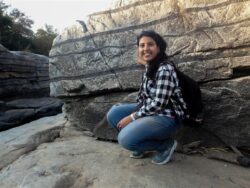 I would encourage everyone to come up and pursue STEM or in any kind of discipline that they are interested in. There’s a lot of opportunities and it’s great to kind of give it a go. We need to just follow our passion. We need to ask the right questions and have and build up a support system, you know, who can have our back. And that is something we need to consciously try and develop wherever we go, have a great bunch of support. Do not second guess yourself. You’re all smart and confident individuals, and there needs to be more of us in STEM so that going down the line we have more women leading in leadership roles in STEM which is what we want because that can change so many things.
I would encourage everyone to come up and pursue STEM or in any kind of discipline that they are interested in. There’s a lot of opportunities and it’s great to kind of give it a go. We need to just follow our passion. We need to ask the right questions and have and build up a support system, you know, who can have our back. And that is something we need to consciously try and develop wherever we go, have a great bunch of support. Do not second guess yourself. You’re all smart and confident individuals, and there needs to be more of us in STEM so that going down the line we have more women leading in leadership roles in STEM which is what we want because that can change so many things.
Dr Marissa Betts – Palaeontology and Geoscience, UNE
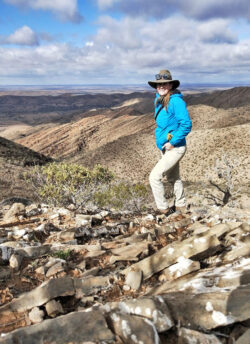 I think it’s all about community. Whatever you end up doing, you’ve got to love the community you’re part of. People don’t often talk about the role that community plays in science. Sometimes you get the impression that people say you’ve either got to be good at it or you’re not. I don’t really believe that necessarily. For me, myself, the reason that I stuck around in science is because I had a wonderful community of people around me when I was doing my undergrad and then my post grad studies. So find what you love, but also find the people you love. And that combination is a winning combination for success, I think.
I think it’s all about community. Whatever you end up doing, you’ve got to love the community you’re part of. People don’t often talk about the role that community plays in science. Sometimes you get the impression that people say you’ve either got to be good at it or you’re not. I don’t really believe that necessarily. For me, myself, the reason that I stuck around in science is because I had a wonderful community of people around me when I was doing my undergrad and then my post grad studies. So find what you love, but also find the people you love. And that combination is a winning combination for success, I think.
Eleanor Beidatsch – UNE HDR Student
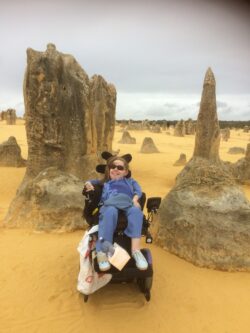
The best thing to do, if you really are interested in a discipline like science, is keep pushing forward and try and find those workarounds. If you encounter a barrier that says it’s not for you, but you want to do it, keep looking for other ways to do it, because there will be a path for you to be a successful female scientist, even if there’s all kinds of obstacles on the way. So, persevere, and definitely, if you love science, do science.
Associate Professor Deb Bower – Zoology, UNE
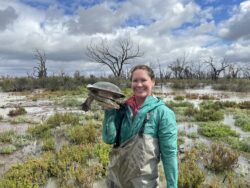 I think it’s important to know yourself and your superpowers. Think about what you enjoy doing and you’re good at doing. So is that writing? Is that being creative? And to find a job that you can do for eight hours a day for the rest of your life. Some people say that you should follow your passion, and I think you should think about whether your passion is something you want to do for work. Science has lots of different opportunities, and so if you learn the skills of asking scientific questions, the scientific process, it gives you skills in writing, in data analysis, in communication, and then that opens up a world of different employment opportunities.
I think it’s important to know yourself and your superpowers. Think about what you enjoy doing and you’re good at doing. So is that writing? Is that being creative? And to find a job that you can do for eight hours a day for the rest of your life. Some people say that you should follow your passion, and I think you should think about whether your passion is something you want to do for work. Science has lots of different opportunities, and so if you learn the skills of asking scientific questions, the scientific process, it gives you skills in writing, in data analysis, in communication, and then that opens up a world of different employment opportunities.
Kaitland Parker – Research Assistant, UNE
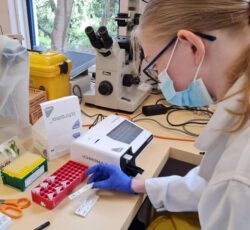
I think my biggest bit of advice would probably be to look for the support that is available to you. UNE, in my experience, has had a lot of support available, particularly in the science field, and it’s really important, especially when you’re coming into university for that first time, to be able to reach out to that support and know how to find it and know how to make use of it, because you can really benefit.
Stephanie Richter-Stretton – UNE PhD Candidate
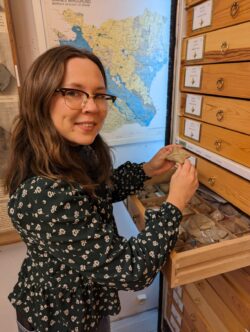
I think the big game changer for me was to surround yourself with other women where you can. It took most of my life to be exposed to a woman role model in STEM, so I know firsthand how tricky it is. But the stronger that network is and the stronger connections you have with other women and girls is what’s really helped me in terms of inspiration and motivation and just feeling connected and supported, and then when those tough days do come along, you have that network to fall back on.
Momena Khandaker – UNE PhD Candidate
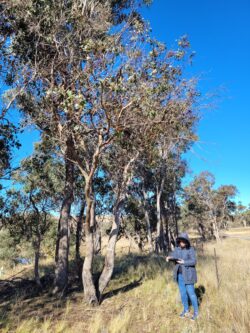
Whoever wants to, just get into it, whatever you feel interested in. Just get into it. Not like, get scared of science. If you don’t like engineering, just don’t go for it. If you like engineering, go for it. Even if you are a woman, that doesn’t mean that you cannot. Women can do everything. That’s what I feel. So go for it, girls. That’s what I say. Science is fun.
Suwijai Jatupohnkhongchai – UNE PhD Candidate
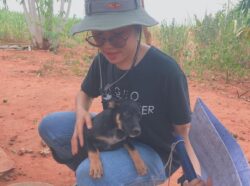 Science is always fun. And, I think the person who always questions things, and always has a curiosity, science is the perfect place for them to find along their journey. Studying whatever branches in science, it’s not too late. I mean, you can start with what whenever you’re ready, even you have the reason to do another thing first. But it’s not too late. At the end, whatever, whenever that you have, when you’re ready to do it, just do it.
Science is always fun. And, I think the person who always questions things, and always has a curiosity, science is the perfect place for them to find along their journey. Studying whatever branches in science, it’s not too late. I mean, you can start with what whenever you’re ready, even you have the reason to do another thing first. But it’s not too late. At the end, whatever, whenever that you have, when you’re ready to do it, just do it.
Hero image by ThisisEngineering RAEng on Unsplash


